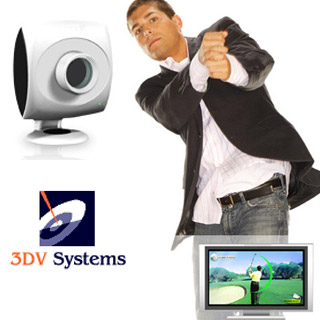 Anxious to outdo the Nintendo Wii, Microsoft is reportedly in talks to acquire 3DV Systems of Israel.
Anxious to outdo the Nintendo Wii, Microsoft is reportedly in talks to acquire 3DV Systems of Israel.
3DV is one of the companies that’s developing a next-generation user interface for games that goes beyond what the Wii motion-sensing controller can do. Israeli site Haaretz reported today that Microsoft plans to buy 3DV for $35 million.
That’s a pretty small amount, considering 3DV has raised $38.5 million. 3DV’s investors include Elron, a member of Nochi Dankner’s IDB group, Pitango, Kleiner Perkins Caufield & Byers, and RDC Rafael Development Corp.
3DV has been working on its ZCams for some time. These cameras function much like Sony’s EyeToy, but they’re much more accurate at detecting motion. That’s because they’re 3-D depth cameras, which sense how far away an object is from the camera. In the camera’s black-and-white imaging, the closer objects are lighter and the more distant objects are darker. The camera captures the locations of objects many times per second, so it can detect an object and its trajectory, making it perfect for game control purposes.
When I did a demo of the technology, I was able to control a game just by waving my arms around. I could fly a plane by pretending to hold a joystick and also box against a virtual fighter by throwing punches toward the camera. The motion detection was accurate, much more so than with the Wii, which uses relatively cheap but primitive accelerometers and infrared technology for motion detection.
3DV is just one of a bunch of companies in this space. Other 3-D depth camera makers include Canesta and PrimeSense. Softkinetic is making software to make the technology more usable, and GestureTek has a bunch of non-gaming gesture-based technologies on the market. Sixense is making another kind of gesture-control interface using magnetic fields.
3DV’s North American general manager is Charles Bellfield, the former marketing chief in the U.S. arm of Capcom and the ex-chief spokesman for Sega of America when the company launched the ill-fated Dreamcast. 3DV has a promising technology, but it has been a long time since the company did the first demos in 2007. 3DV has been trying to commercialize the technology ever since and was trying to create cameras for less than $100. Microsoft would certainly be an ideal candidate to buy the technology, but the purchase price for the company certainly seems less than ideal.
Microsoft could either use 3DV Systems’ technology in a new game that comes with a gesture-control accessory, or it could put the 3DV technology into a brand new video game console. If it did the former, it could very quickly introduce something better than the Wii for use with the current Xbox 360 or the PC. The gesture-control accessory could work with just one game, much like Activision Blizzard packages a guitar accessory with its Guitar Hero games.
The risk of that strategy is that game developers aren’t likely to develop games that take advantage of that accessory unless that game is a massive hit. More ideally, Microsoft could wait until it can introduce the new gesture-control technology with a new game console in a few years. That way, developers can create games for it knowing that every single console sold will have the gesture control. The risk of waiting is that the Wii is likely to clean up in the meantime.
Microsoft has to pick the right moment to introduce the technology, and it has to pick the right technology. But there is no question they have to move into gesture controls. This is one of the most closely watched spaces in video game technology ever since Nintendo proved that clever thinking about the user interface was critical to getting consumers. The Wii is the No. 1 game console, even though its graphics aren’t as good as the Xbox 360’s or the Sony PlayStation 3’s.
Microsoft and 3DV declined comment.
VentureBeat's mission is to be a digital town square for technical decision-makers to gain knowledge about transformative enterprise technology and transact. Learn More
